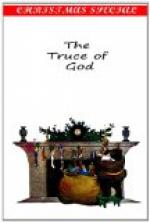This long interview was here terminated by the bell of the Benedictine, summoning to dinner. The Baron of Hers was noted for his fine person and his polished address, and saluted them with even more than his usual politeness as they entered the dining-room. He was the only one of the group who seemed at ease; for the two missionaries could not forget the death of Anno—and Gilbert, from some cause or other, had lost his sprightliness.
“I fear,” said the knight to Father Omehr, “that you have half made a traitor of Gilbert, for he will no longer let me abuse my friends at Stramen, but sides with them against me. It is hard to fight our battles all alone, and against our friends, after forty.”
“The Lady Margaret, who dressed his wound, must be blamed—not I,” replied the priest.
The handsome face of the Baron of Hers, in an instant, became black as night, and as quickly recovered its former mildness; but the change, apparently, was not noticed by him who had caused it.
“I have heard,” resumed the knight, in a careless tone, “that the young lady possesses much virtue, intelligence, and beauty, and is wise enough to prefer the cloister to the court.”
“You have not been misinformed; yet her health is so feeble, that the grave will probably anticipate her choice of either.”
It was not until the close of the meal that the Lord of Hers was informed of the death of the Archbishop of Cologne, and from that time until they rose the conversation turned wholly upon the venerated and saintly prelate.
Toward sunset they descended the hill and walked along the picturesque banks of the lake. The noble sheet of water stretched away to the south far as the eye could reach, burnished by the sun, and forming part of the horizon.
“This lake of ours,” said the baron, “has obtained a reputation which the best man cannot expect—and, indeed, would not desire: no one has ever breathed a word against it.”
“There is a boat!” interposed Gilbert, pointing to a speck in the distance, which his father discovered after a long search, and was invisible to their two older companions. They stood in the shadow of some trees, and watched the object as it increased in size and gradually assumed the undeniable outline of a boat. It came from the direction of Zurich, and pointed directly to the castle. As it neared, they could distinguish four stout rowers and a person seated in the stern. With increased speed it seemed—for it was now within hailing distance—the boat darted straight to where they were standing; and, before it was made fast, the gentleman in the stern sprang ashore, and, removing the cloak in which he had been enveloped, discovered the princely features of Rodolph, Duke of Suabia. Rodolph was descended from the counts of Hapsburg, on the father’s side—and, on the mother’s, from the illustrious family of Otto the Great. He was styled King of Arles, and resided for the most




